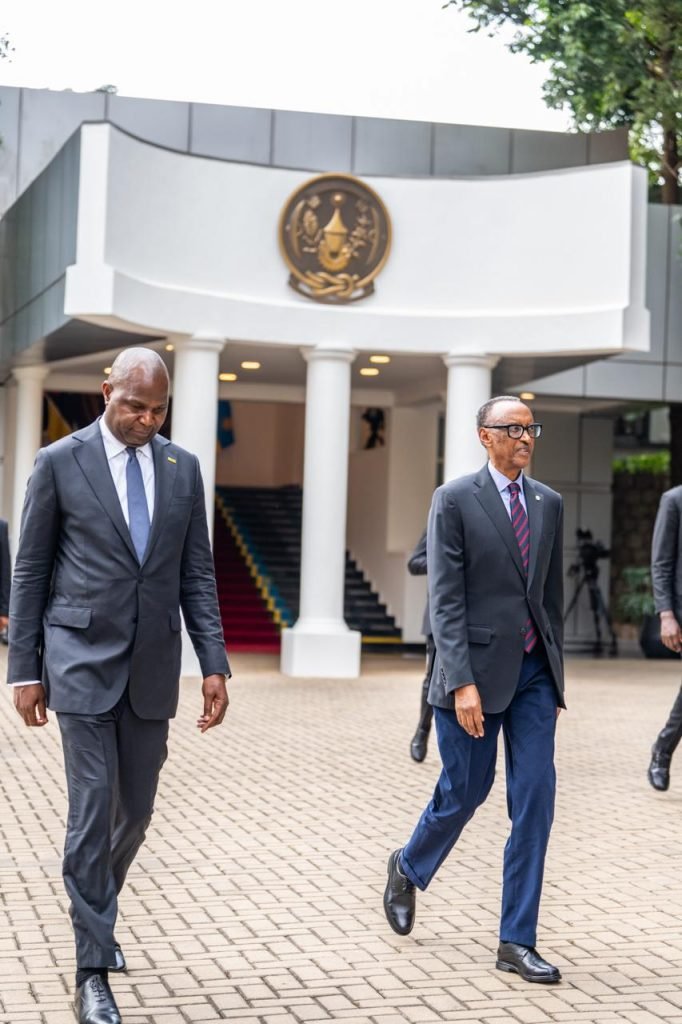Rwanda and Mozambique have reinforced their partnership in security, trade, and defense as both nations seek African-driven solutions to threats such as terrorism and economic underdevelopment.
Mozambican President Daniel Chapo paid a two-day working visit to Kigali, where he and President Paul Kagame signed a series of cooperation agreements designed to strengthen peace, security, investment, and trade. The visit marked another step in a growing alliance between the two countries, one rooted in mutual regional interests and a shared vision of self-reliance.
One of the most notable outcomes was the signing of the Status of Forces Agreement (SOFA). This accord provides a legal framework for Rwandan troops currently operating in Mozambique’s troubled Cabo Delgado province. Since mid-2021, approximately 1,000 Rwandan soldiers have been assisting Mozambican forces to counter an Islamic State–linked insurgency that has destabilized northern Mozambique and threatened regional security.
President Kagame emphasized the urgency of relying on African solutions to African problems. “Outsourcing responsibility to external actors cannot build lasting peace,” he said. His words underscored Rwanda’s longstanding belief that regional stability is best secured through cooperation between African states themselves.
President Chapo expressed gratitude to Rwanda for its continued support in quelling extremist violence. He noted that the deployment of Rwandan forces has played a significant role in restoring relative calm in Cabo Delgado, despite sporadic attacks that still challenge Mozambique’s security.

Cooperation Expands Beyond Security Front
The two leaders also turned their attention to economic growth. A memorandum of understanding was signed between Rwanda’s Development Board and Mozambique’s Investment and Export Promotion Agency (APIEX). This agreement aims to increase trade and investment between the two countries while building on earlier commitments established in 2021 and reinforced during the 2023 Rwanda-Mozambique Business Forum in Kigali.
Key areas of focus include agriculture, agro-processing, fisheries, energy, infrastructure, tourism, and industry. The collaboration is expected to generate new opportunities for businesses while creating jobs, particularly for women and young people. President Chapo described Mozambique as Rwanda’s strategic gateway to Southern Africa and encouraged companies from both sides to pursue joint ventures that strengthen regional economic integration.
Another proposal under discussion is direct air connectivity between Kigali and Maputo. Such a move would ease business travel and enhance people-to-people exchanges, further cementing ties between the two countries.
This deepening cooperation goes beyond bilateral interests and reflects broader continental ambitions. Both leaders strongly support the African Continental Free Trade Area (AfCFTA), which aims to create a unified African market. Their push for African-led solutions in security and economic growth resonates with calls for less dependency on external powers in tackling the continent’s pressing challenges.
The Rwanda-Mozambique relationship today stands as a model of strategic partnership—one that integrates defense, trade, and diplomacy. By prioritizing mutual interests and coordinated action, the two countries are shaping a path toward stability and prosperity in the region.
READ ALSO: IMF-Ghana Rep Urges Stricter Fiscal Rule Enforcement, Pledges Technical Support



















